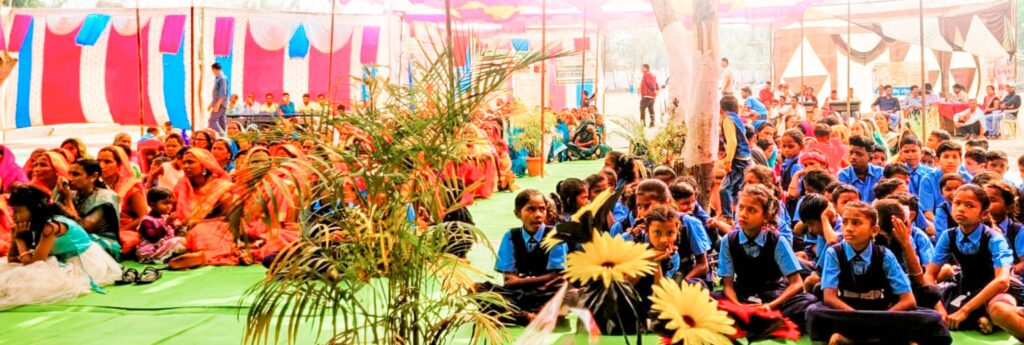
Organising ‘a grand women’s gathering’ in the village Mehtakheda, located on the border of Maharashtra and Chhattisgarh (Gondia district), and known as a Naxal-affected area, must have taken a lot of courage, I ask Rajeev Warbhe, president of the Rotary Club Of Nagpur South East, RID 3030, which had recently organised this event.
In this mega gathering, various activities were organised for women from rural and tribal Naxal areas, including a kabaddi match, tribal dances, and providing a connect to women’s self-help groups with banking, healthcare and agricultural services provided by the government of India, but about which residents in remote, rural areas have little or no knowledge.
We’ve organised free medical camps in the Naxal-affected villages of this region and have given out free medicines.
– Rajeev Warbhe, president, RC Nagpur South East
Answering my question, Warbhe smiles and says, “I was the medical director of my club for three years, and during that time, our club has been conducting medical camps in Naxalite infested districts of Gondia and Gadchiroli in partnership with the local police. Actually, in recent times, the situation pertaining to Naxal activities has changed. Community policing has started, and along with other government departments, the local police have been reaching government welfare schemes to the people and improving their relations with the villagers living in these areas.”
He says that some of the recent initiatives undertaken by the police department include crucial and helpful activities such as helping the villagers to get Aadhaar cards and benefits under government welfare schemes such as the Ayushman Bharat Yojana and other schemes. Also, he adds, the agriculture ministry of GoI has so many subsidy schemes for the farming community, which these villagers know nothing about, and the police have been helping them to connect with the local agricultural officials and benefit from these schemes. “By such action, the police and some other government departments have won the confidence of the people, so and so that when these people face any problem, they first contact the police,” he adds.
So many of the cataract operation beneficiaries didn’t even know that they can get such an operation done, or it is available. Many of the people were afraid even to enter a hospital.
In this changing scenario, Warbhe explains that the club members had earlier conducted a school programme where lot of women had come, and after discussion and consultation with the Gondia SP Nikhil Pingle, and the local NGO which works with the villagers, the Rotarians organised the gala event for the women, where the Rotarians educated them about the various government schemes, connected them to the people to be contacted for the different schemes, and gave out gifts to both the women and children of the local zilla parishad school. Though the club spent only around ₹48,000 on this programme, its impact was huge.

Healthcare services for “the underprivileged communities residing in the Naxal-affected districts of Gondia and Gadchiroli have been an ongoing project of RC Nagpur South East, conducted in association with the Police Dal to ensure security and accessibility in these areas. We’ve organised free medical camps in remote villages within the Naxal-affected areas of this region and offered a variety of medical services, including consultations, diagnostics such as tests for BP, diabetes, ECG, sickle cell anaemia in women, and have given out free medicines.”
In recent times, the situation pertaining to Naxal activities has changed. Community policing has started, and along with other government departments, the local police have been reaching government welfare schemes to the people and improving their relations with the villagers living in these areas.
– Rajeev Warbhe
After the screening, those requiring further care are taken to the Shalinitai Meghe Super Specialty Hospital, Nagpur, for treatment and free surgeries. Warbhe says that during and after the medical camps he had earlier organised, “around 1,350 cataract operations for the people from these villages were done and we also organise the transport to drop them back to their homes after the treatment.”
While the club is committed to continue health camps in these remote rural and tribal areas, Warbhe says that so many of the cataract operation beneficiaries “didn’t even know that they can get such an operation done, or it is available. They have lived in such circumstances, that many of the people were afraid even to enter a hospital. And those who were admitted, didn’t like to sleep on beds and spread a bedsheet on the floor and slept on it. I myself know a couple who flatly refused to even come to the hospital for treatment.”
The club president added that the Rotarians have also been working to improve facilities and infrastructure at the zilla parishad schools by painting the building, giving new furniture etc. During the grand event for the women, 1,000 sanitary napkins were distributed to rural women, five sets of vermicompost units were given to women’s self-help groups and 500 water aerators were distributed to the women, and some gifts were given to the students of the local zilla parishad school. Bank officials were also invited to the programme to connect them with the self-help groups which required loans to start small ventures.
Inaugurating the event SP Pingle congratulated the Rotarians for engaging with the village women, and educating them about their rights and entitlements from the various government schemes that were available for them. “By doing so, you are boosting their morale and giving them confidence to face all issues and problems they meet in their daily lives.”
Warbhe added that the women were very happy to know that they will now be able to get finance from the banks and also other agricultural subsidies. The headmaster of the local school, children and their parents, panchayat officials and Rotarians participated in this project, which he is confident “will go a long way in empowering these women and creating a bright future for them and their families.”












